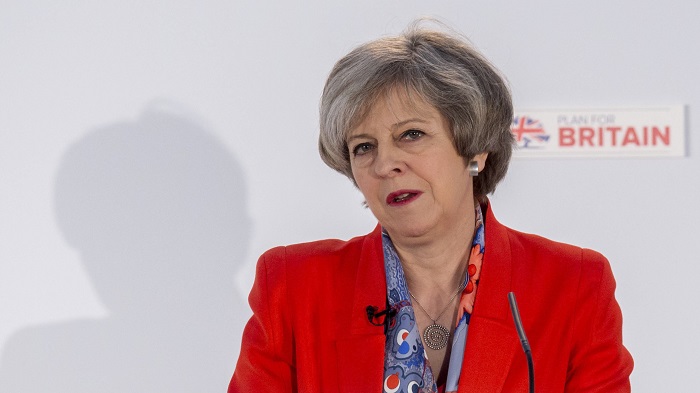May will never accept Brexit border in Northern Ireland
Published : 09 Jun 2018, 01:28
British Prime Minister Theresa May shrugged off Friday what appeared to be a frosty response to Britain's proposals to avert a hard border between Britain and Ireland after Brexit.
Britain presented to Brussels what it called its backstop proposals for a time-limited continued link to the European Union's customs union after Brexit.
The backstop plan is intended to come into play if Britain and the EU fail to agree a new trading deal after Britain finally ends its links to the bloc.
The 500-kilometer border between the Irish Republic and Britain's Northern Ireland will become the only EU land border in the British Isles.
Both May and the Irish government has said a hard border between the two will be unacceptable.
In his first response to Britain's proposals, the European Union(EU)'s chief Brexit negotiator Michel Barnier said at a media conference in Brussels that any backstop to prevent the return of a hard border in Ireland could only apply to Northern Ireland and not the whole of Britain as the British government suggested. Otherwise there was a risk the backstop could turn into backdoor access to the EU's single market and without proper enforcement of its rules.
That would mean a border down the Irish Sea, leaving Northern Ireland within a customs union, and the British mainland outside, an idea rejected by May.
May's official spokesperson at Downing Street said Friday: "The prime minister has been clear that we will never accept a customs border between Northern Ireland and the rest of the United Kingdom.
"We are also committed to maintaining the integrity of our own internal market. That position will not change. The (European) Commission's proposals did not achieve this, which is why we have put forward our own backstop solutions for customs. Michel Barnier has confirmed today that discussions will now continue on our proposal."
Avoidance of a hard border on the island of Ireland is seen as critical to maintaining the integrity of the Belfast Peace Agreement which brought to an end decades of troubles, killings and shootings in Northern Ireland.
May, who has travelled to Quebec for the G7 meeting said in media interviews: "The border between Northern Ireland and Ireland matters. It matters to people who live on both sides of that border, it matters to the United Kingdom because we want to ensure that we're delivering a Brexit that works for every part of the United Kingdom and that includes Northern Ireland.
"But I'm also clear that we cannot accept the proposals that the European Commission originally put forward, that would have meant there was a border down the Irish sea cutting Northern Ireland from the rest of the UK. I want to deliver Brexit and I want to deliver it for the whole of the United Kingdom."
There was also a sharp response to Barnier's comments from the Democratic Unionist Party (DUP) in Northern Ireland.
DUP leader Arlene Foster said: "We will not tolerate the annexation of Northern Ireland. Let's focus on getting a new trade deal."
The party's deputy leader Nigel Dodds was even more forceful in his response, saying Barnier's response showed he had no respect for the constitutional integrity of Britain.
Following last year's general election when May lost her majority in the House of Commons, she relies on support of the DUP to shore up her majority.


